
Frank Vincent Zappa was an American musician, singer, composer, songwriter and bandleader. His work is characterized by nonconformity, free-form improvisation, sound experiments, musical virtuosity and satire of American culture. In a career spanning more than 30 years, Zappa composed rock, pop, jazz, jazz fusion, orchestral and musique concrète works, and produced almost all of the 60-plus albums that he released with his band the Mothers of Invention and as a solo artist. Zappa also directed feature-length films and music videos, and designed album covers. He is considered one of the most innovative and stylistically diverse musicians of his generation.

The Sex Pistols were an English punk rock band that formed in London in 1975. Although their initial career lasted just two and a half years, they are regarded as one of the most groundbreaking acts in the history of popular music. They were responsible for initiating the punk movement in the United Kingdom and inspiring many later punk and alternative rock musicians. Their fashion and hairstyles have been credited as a significant influence on punk image, and they are often associated with anarchism within music.

'Til Tuesday was an American new wave band formed in Boston, Massachusetts, United States. The band, consisting of Aimee Mann, Robert Holmes (guitar), Joey Pesce (keyboards), and Michael Hausman (drums), was active from 1982 to 1989. They are best known for their 1985 hit single "Voices Carry".
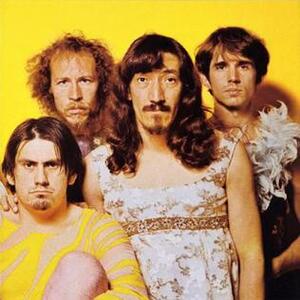
We're Only in It for the Money is the third studio album by American rock band the Mothers of Invention, released on March 4, 1968 by Verve Records. As with the band's first two efforts, it is a concept album, and satirizes left- and right-wing politics, particularly the hippie subculture, as well as the Beatles' album Sgt. Pepper's Lonely Hearts Club Band. It was conceived as part of a project called No Commercial Potential, which produced three other albums: Lumpy Gravy, Cruising with Ruben & the Jets, and Uncle Meat.

Surfer Rosa is the debut studio album by the American alternative rock band Pixies, released in March 1988 on the British label 4AD. It was produced by Steve Albini. Surfer Rosa contains many of the elements of Pixies' earlier output, including Spanish lyrics and references to Puerto Rico. It includes references to mutilation and voyeurism alongside experimental recording techniques and a distinctive drum sound.
Black 47 was an American Celtic rock band from New York City, formed in 1989 by Larry Kirwan and Chris Byrne, and derives its name from a traditional term for the summer of 1847, the worst year of the Great Famine in Ireland.

Into the Fire is the fifth studio album by the Canadian rock singer Bryan Adams. It was co-written by Jim Vallance. It was released on 30 March 1987 by A&M Records as the follow-up album to the chart-topping Reckless (1984). Into the Fire peaked at number seven on the US Billboard 200 chart and reached the Top 10 in several other nations. Six singles were released from the album: "Heat of the Night", "Hearts on Fire", "Victim of Love", "Only the Strong Survive", "Into the Fire" and "Another Day".

The Mothers of Invention was an American rock band from California. Formed in 1964, their work is marked by the use of sonic experimentation, innovative album art, and elaborate live shows.
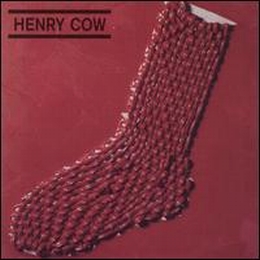
In Praise of Learning is a studio album by British avant-rock group Henry Cow, recorded at Virgin Records' Manor studios in February and March 1975, and released in May 1975. On this album, Henry Cow had expanded to include members of Slapp Happy, who had merged with the group after the two had collaborated on Desperate Straights in 1974. The merger ended after recording In Praise of Learning when Peter Blegvad and Anthony Moore from Slapp Happy left the group.
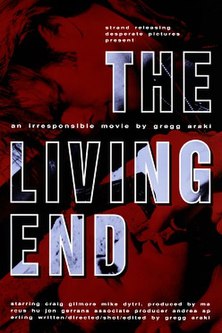
The Living End is a 1992 American comedy-drama film by Gregg Araki. Described by some critics as a "gay Thelma and Louise," the film is an early entry in the New Queer Cinema genre. The Living End was nominated for a Grand Jury Prize at the Sundance Film Festival in 1992.
A diss track, diss record or diss song is a song whose primary purpose is to verbally attack someone else, usually another artist. Diss tracks are often the result of an existing, escalating feud between the two people; for example, the artists involved may be former members of a group, or artists on rival labels.

Beauty and the Beast: Original Motion Picture Soundtrack is the official soundtrack album to the 1991 Disney animated feature film, Beauty and the Beast. Originally released on October 24, 1991, by Walt Disney Records, the album's first half – tracks 2 to 9 – generally contains the film's musical numbers, all of which were written by composer Alan Menken and lyricist Howard Ashman, while its latter half – tracks 10 to 14 – features its musical score, composed solely by Menken. While the majority of the album's content remains within the musical theatre genre, its songs have also been influenced by French, classical, pop and Broadway music. Credited to Various Artists, Beauty and the Beast: Original Motion Picture Soundtrack features performances by the film's main cast – Paige O'Hara, Richard White, Jesse Corti, Jerry Orbach, Angela Lansbury, Robby Benson and David Ogden Stiers – in order of appearance. Additionally, the album features recording artists Celine Dion and Peabo Bryson, who perform a pop rendition of the film's theme song of the same name, which simultaneously serves as the soundtrack's only single.

"Who Are the Brain Police?" is a Frank Zappa song, performed by The Mothers of Invention, released on the Mothers' debut album, Freak Out!. It was released by Verve Records as a single in 1966. Zappa stated that the song was one of religious theme.
"Living in the Heart of the Beast" is a 1975 song written by Tim Hodgkinson for the English avant-rock group Henry Cow. It was recorded in 1975 by Henry Cow with Slapp Happy, who had recently merged with Henry Cow after the two groups had recorded a collaborative album, Desperate Straights the previous year. The song was released on In Praise of Learning in May 1975 by Virgin Records. The song's title is a quote from the nineteenth-century Cuban poet and liberation fighter José Martí. "Living in the Heart of the Beast" was the first of two "epic" compositions Hodgkinson wrote for Henry Cow, the second being "Erk Gah" (1976), later known as "Hold to the Zero Burn, Imagine".

Robert Parker Jameson was an American singer-songwriter who was briefly promoted as a major star in the early 1960s and later attracted a cult following with his 1965 album Songs of Protest and Anti-Protest, issued under the name Chris Lucey. The album's dark lyrics and sophisticated arrangements led its advocates to note similarities with Love's 1967 album Forever Changes. For decades, little was known about Jameson or his origins, and he was more famous for engaging in public disturbances and suicide attempts than his music.
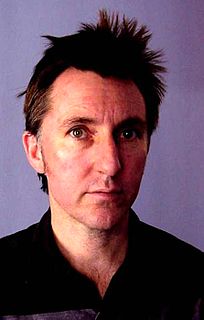
Warrick Swinney, more commonly known as Warrick Sony, is a South African composer, producer, musician and sound designer. He is the founder and sole permanent member of the Kalahari Surfers. They made politically radical satirical music in 1980s South Africa, and released it through the London-based Recommended Records. During this time the Surfers toured Europe with English session musicians.

Bigger than Jesus was, in 1989, the fourth full-length album by the Kalahari Surfers, the recording identity of South African musician Warrick Sony.
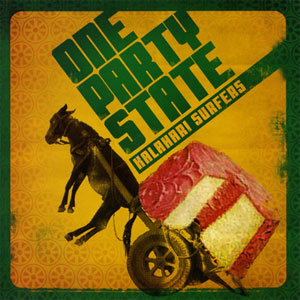
One Party State is a 2010 album by the Kalahari Surfers, the recording identity of South African musician Warrick Sony. It was released on Microdot and debuted at the African Soul Rebels Tour in the UK alongside Oumou Sangaré & Orchestre Poly-Rythmo De Cotonou. It features Sowetan poet Lesego Rampolokeng on four tracks. The Mail & Guardian called it "a politically drenched album... track for track the most solid South African release of 2010".

American Aquarium is an American alternative country band from Raleigh, North Carolina, United States.

"(Straight to Your Heart) Like a Cannonball" is a song written by Van Morrison that was first released on his 1971 album Tupelo Honey. It was also released as the third single from the album but did not chart.

















